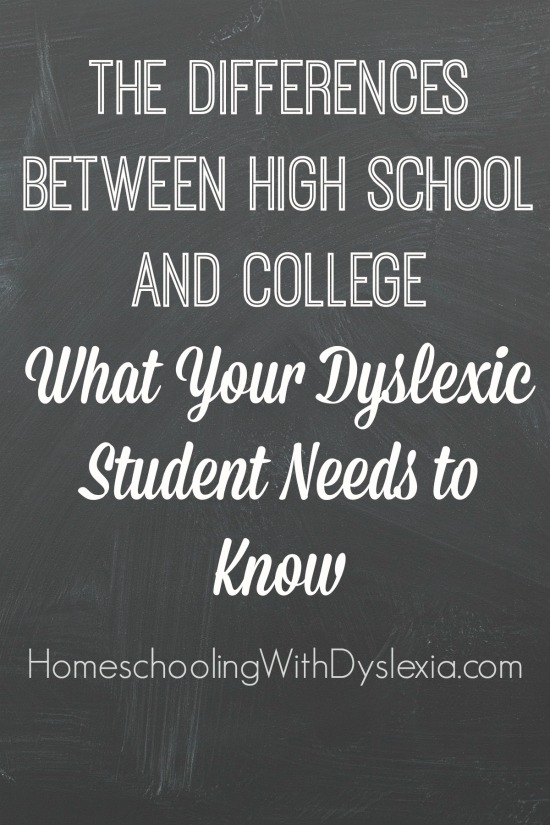Thank you for joining me on for this 10-day series on Preparing Your Student With Dyslexia for College Success. To read the whole series from the beginning, click here.
There are some significant differences between high school and college with which you and your students should be familiar. Essentially, students become much more independent in college; they are fully responsible for their assignments, schedules, and obtaining any accommodations they may need. Since many students with dyslexia struggle with organization, handling this newfound independence can result in problems.

Differences Between High School and College
High School
- Others structure student’s time
- Parents and teachers remind, prioritize and guide student
- Spend approximately 6 hours/day, 30 hours a week in class
- Student is told what to study, learn and do
- Teachers remind student of incomplete work
- Effort counts
- Parents get notified
College
- Student manages own time
- Student makes own decisions
- Only 12-16 hours of class/week
- Student is responsible for figuring out what to learn study and do
- Nobody reminds student of incomplete work
- Results count
- Parents are not notified
As you can see from this list, college students need to be self-motivated and have some solid organization and time management skills to manage all of their new found freedoms and responsibilities. See day one of this series, College Readiness: What Successful Students Do for a more complete list of essential skills.
Legal Differences
Another difference between high schools and colleges are that high schools are governed by the Individuals With Disabilities Act (IDEA) but colleges are governed by the Americans with Disabilities Act (ADA). If you are in a public school and have either an IEP or a 504 Plan, these will be obsolete in college. If you need accommodations in the college classroom, it will be up to you to obtain them.
In fact, it is illegal for colleges to ask about disabilities in the admissions process. It is up to you as to whether you disclose your dyslexia during the application process. You don’t have to disclose any learning disabilities to receive special services once you are a student there. Read this interesting article from US News on the benefits of disclosing a learning disability during the college application process.
Modification and Accommodations in College
One of the major differences in college is that students no longer receive modifications to the curriculum as they may have done in high school. College students with dyslexia will be expected to complete the same assignments as everybody else. However, in college, dyslexic students can expect to receive accommodations such as extra time for assignments and tests and course substitutions in subjects like foreign languages.
In order to receive accommodations, you will need to actively report your learning issues and be in communication with the Office of Student Services and your instructors.
Most colleges have an office dedicated to assisting students with disabilities. You are encouraged to contact them even before you apply to see what kinds of services you can expect from that school. You will need to show proof of your dyslexia, usually in the form of a report prepared by a licensed psychologist or doctor that indicates the tests that were used to determine your learning disability and the scores you achieved. I will talk more about accommodations within the college on Day 6 – Types of College Support Programs and on Day 8 – Understanding the Application Process. For now, know that most colleges offer some level of support.
Understanding the differences between high school and college will help you as you plan for the college years. Teaching your students to be self-aware and how to self-advocate now will help them immensely when they begin to experience the responsibilities and independence of the college campus.
Isn’t it reassuring to know that colleges offer help for students with learning issues? Join me tomorrow when I will be talking about the Different Types of College Support Programs – information that will help you as you choose which college is the best fit for your dyslexic high school student.
Please Share!
Thank you for joining me here today for the 10-day series – Preparing Your Dyslexic Student for College Success. If you haven’t subscribed and would like further posts from HomeschoolingWithDyslexia.com to come to your inbox, click here to sign up for free email updates from Homeschooling With Dyslexia.
Join me today over on the Homeschooling With Dyslexia Facebook page to further the discussion of preparing your dyslexic student for college success.
Please help me spread the word about this series by sharing this post via the links below to Facebook, Twitter, Pinterest or a by leaving a comment below.







0 Comments